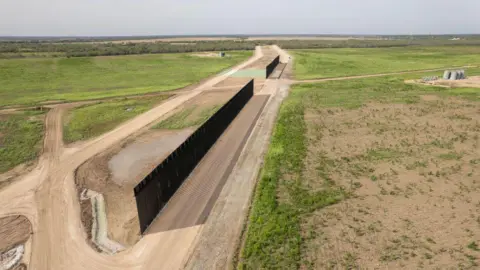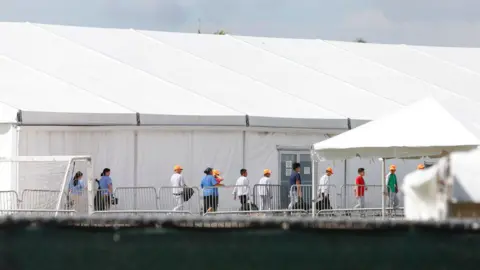ARTICLE AD BOX

 Getty Images
Getty Images
The land is in Texas' Starr County in the Rio Grande Valley, on the border with the Mexican state of Tamaulipas
Texas authorities say they are prepared to offer President-elect Donald Trump 1,400-acres (567 hectares) of land along the US-Mexico border to build detention facilities for undocumented migrants.
In a letter, the Texas General Land Office said the plot could be used to build facilities for "processing, detention, and co-ordination of the largest deportation of violent criminals in the nation's history".
Trump has repeatedly pledged to deport millions of undocumented migrants and mobilise the National Guard to help carry this out.
His plan, however, is likely to face enormous financial and logistics hurdles, as well as immediate legal challenges from rights groups.
The letter, published online and sent to Trump at his Mar-a-Lago estate in Florida, notes that the owner of the recently purchased land had refused to allow a border wall to be built there and "actively blocked law enforcement" from accessing it.
"Now it's essentially farmland, so it's flat, it's easy to build on. We can very easily put a detention centre on there," Texas Land Commissioner Dawn Buckingham said in an interview with Fox News, which first reported the offer.
The state government in Texas, which launched its own unilateral border security operation after Trump left office, has been broadly supportive of Trump's promises to strengthen the US-Mexico border.
Buckingham said she was "100% on board with the Trump administration's pledge to get these criminals out of our country".
But the Democratic governors of three other southern border states - California, Arizona, and New Mexico - have said they will not aid mass deportations.
What any new detention facilities would look like is unclear, although the incoming "border czar" Tom Homan has suggested they could be "soft-sided".
Facilities currently in use range from soft-sided, camp-like facilities used by Customs and Border Patrol to house undocumented migrants for short periods of time, as well as brick-and-mortar buildings used by Immigrations and Customs Enforcement, or ICE.
County and state jails are also used, for which local jurisdictions receive compensation from immigration authorities.
Stephen Miller, the top Trump adviser on immigration who has been picked as deputy chief of staff for policy, has previously said the Trump administration would build vast holding facilities to serve as staging centres for mass deportations.

 Getty Images
Getty Images
Migrant detention facilities range from brick-and-mortar facilities to tent facilities, such as this one in Florida
In a late 2023 interview with the New York Times, Miller said that the facilities would likely be built on open land near Texas' border with Mexico.
A 2024 spending bill signed by President Joe Biden allocated $3.4m (£2.69m) for ICE to house as many as 41,500 on any given day.
"If Trump conducts mass deportations, ICE would blow past that number very quickly," Adam Isacson, a migration and border expert from the Washington Office on Latin America told the BBC.
ICE data compiled by the Transactional Records Access Clearinghouse at Syracuse University found that there were 38,863 immigrant detainees being held as of 2 November.
The largest number - just over 12,000 - are held at facilities located in Texas.
News of Texas' offer to the president-elect comes as Democratic-run cities and states have vowed to not co-operate with Trump's promises of mass deportations.
On Tuesday, for example, Los Angeles' city council passed a "sanctuary city" ordinance to bar using local resources to help federal immigration authorities.
Kathleen Bush-Joseph, a policy analyst at the Washington-based Migration Policy Institute, said that the fact that Republican-led states are more likely to co-operate with the Trump administration's immigration goals could create a "patchwork of protections" that differ widely across the country.
"We might see the divide between red and blue states widen," she said.
Ms Bush-Joseph added that additional facilities in Texas could also mean that undocumented migrants detained in the US interior could ultimately be moved and processed there.
"If you're picking up people in blue states, and they don't have detention facilities available, then do you try to move them to red states?" she asked. "That's the question.""

 6 months ago
25
6 months ago
25








 English (US) ·
English (US) ·